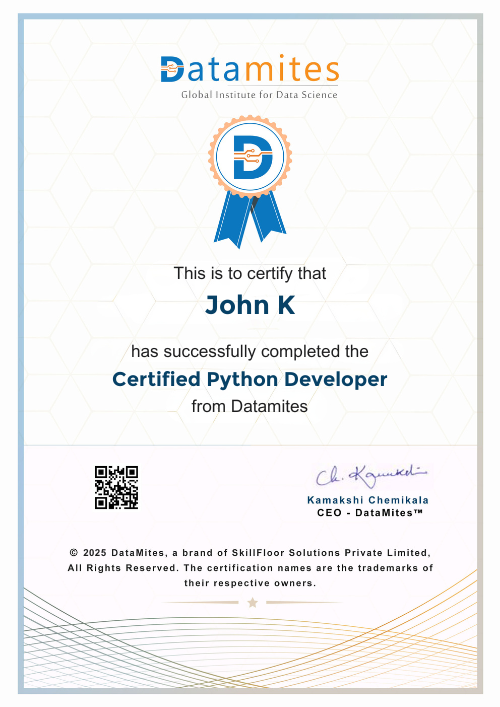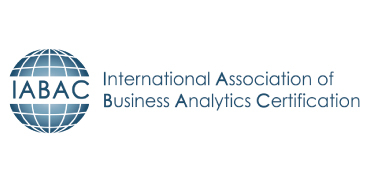Instructor Led Live Online
Self Learning + Live Mentoring
Customize Your Training

• Introduction of python
• Installation of Python and IDE
• Python Variables
• Python basic data types
• Number & Booleans, strings
• Arithmetic Operators
• Comparison Operators
• Assignment Operators
• IF Conditional statement
• IF-ELSE
• NESTED IF
• Python Loops basics
• WHILE Statement
• FOR statements
• BREAK and CONTINUE statements
• Basic data structure in python
• Basics of List
• List: Object, methods
• Tuple: Object, methods
• Sets: Object, methods
• Dictionary: Object, methods
• Functions basics
• Function Parameter passing
• Lambda functions
• Map, reduce, filter functions
• Decorators
• Generators
• Context Managers
• Metaclasses
• Inheritance and Polymorphism
• Encapsulation and Abstraction
• Class methods and static methods
• Special (magic/dunder) methods
• Property decorators - getters, setters, and deletes
• Working with files
• Reading and writing files
• Buffered read and write
• Other file methods
• Logging & Debugger
• Modules and import statements
• SQL Basics
• Creating DB Table
• INSERT, READ, UPDATE, DELETE
• Introduction to MongoDB
• CRUD operations in MongoDB
• namedtuple(), deque, ChainMap,
• Counter, OrderedDict, defaultdict,
• UserDict, UserList, UserString
• Exceptions handling with try-except
• Custom exception handling
• List of general use exception
• Best practice exception handling
• Generators, Iterators
• The Functions any and all
• With Statement
• Data Compression
• A Daytime Server
• Clients and Servers
• The Client and Server Programs
• Classes and Threads
• Multi-threading; thread life cycle
• Regular Expression Syntax
• Group, Split and wildcards
• Quantifiers
• Match, Search and Find all methods
• Character Sequence
• Introduction to OpenCV, Installation
• Basic Operations on Images
• Image Filtering
• Image Classification
• Introduction to GIT
• Basic Git commands
• Introduction to Flask and Installation
• Creating project
• Routing,templates, forms and database integration
• Deployment on render
• Django Introduction and Installation
• Creating a Project
• Django Architecture and File Structure
• Folder Structure, First Django project
• Database and Views, Static Files and Forms
• URL Mapping and Routing
• Defining Models and Relationships
• Database Migrations and Schema Changes
• Querying Data using Django ORM
• Model Forms and Form Validation
• HTML Forms in Django
• Model Forms and Form Validation
• Formsets and Inline Formsets
• File Uploads and Validation
• Deploying Django Applications
• Hosting Options (e.g., Heroku, AWS)
• Project Showcasing and Review
Python is an interpreted, high-level, general-purpose programming language known for its simplicity and readability.
Python is used for a wide range of applications, including web development, data analysis, machine learning, artificial intelligence, and scientific computing.
Skills required for Python Programming include an understanding of programming concepts like variables, data types, loops, and functions, proficiency in using Python libraries like NumPy, Pandas, and Matplotlib for data manipulation and visualization, and knowledge of frameworks like Django and Flask for web development.
Tools for Python Programming include an IDE or text editor like PyCharm or VS Code, a Python interpreter, a version control system like Git, and libraries like NumPy, Pandas, and Matplotlib for data manipulation and visualization.
Python skills are in high demand for various job roles such as software developer, data analyst, machine learning engineer, web developer, and scientific researcher.
The eligibility criteria for learning Python course in Singapore is a basic understanding of mathematics and programming concepts is beneficial.
The Python course fee in Singapore ranges from SGD 489.71 to SGD 652. 95.
The duration of Python training can differ based on various factors like the course level, training intensity, and delivery mode. Usually, completing a basic Python course may take around 4 to 10 weeks, whereas an advanced course may take 10 to 15 weeks. However, the duration of online Python courses might vary slightly compared to classroom-based training.
The salary of a Python developer in Singapore ranges from S$ 6,435 per year according to a Glassdoor report.
For individuals seeking Python training in Singapore, DataMites is a top-rated institute that provides a comprehensive program covering essential aspects of Python programming. Their training is designed for both novice and experienced learners, making it an ideal option for anyone seeking to improve their Python skills
DataMites Institute is an excellent option for Python training due to its comprehensive program, experienced trainers, and flexible delivery modes. Their practical-oriented training with hands-on projects and placement assistance also makes them a popular choice for learners seeking to improve their Python skills.
DataMites is an excellent choice for Python training due to its comprehensive program, experienced trainers, and flexible delivery modes. Additionally, their practical-oriented training with hands-on projects and placement assistance makes them an ideal option for learners seeking to improve their Python skills and boost their career prospects.
DataMites provides Python courses of varying durations to suit different learning needs. The basic Python course can be completed within 4 to 6 weeks, whereas the advanced course may take up to 12 weeks. The online Python course is self-paced, allowing learners to learn at their own pace. Additionally, DataMites also offers a Certified Python Developer Course in Singapore, which has a duration of 4 months.
The fees for Python courses at DataMites in Singapore are flexible, starting from SGD 394 to SGD 450 while the Certified Python Developer Training costs range between SGD 394 to SGD 700
Learning Through Case Study Approach
Theory → Hands-on → Case Study → Project → Model Deployment
DataMites offers a unique program called Flexi Pass, which allows learners to choose and attend any three courses of their choice from a wide range of courses offered by DataMites within a year. This program enables learners to select courses that align with their interests and career goals and complete them at their own pace and convenience. Moreover, the Flexi Pass provides additional benefits like access to webinars, workshops, and recorded sessions. It is a perfect option for learners who want to enhance their skill set and knowledge in different fields.
Yes, a free demo class will be provided to you to give you a brief idea of ??how the training will be done and what will be involved in the training.
DataMites does not provide classroom-based Python training in Singapore. Instead, they offer online training programs that allow learners to study at their own pace and convenience from anywhere. These online courses are suitable for both beginners and advanced learners and are taught by experienced trainers.
Yes, DataMites awards certification to learners who pass the certification exam. This certificate is acknowledged by different organizations and industries, indicating the learner's competence in Python programming. Obtaining the certification can enhance career advancement and job opportunities for learners. Furthermore, DataMites supports learners in preparing for the certification exam, ensuring that they are well-equipped and confident in their skills.
The different payment methods available for DataMites Python training Online are:
The DataMites Placement Assistance Team(PAT) facilitates the aspirants in taking all the necessary steps in starting their career in Data Science. Some of the services provided by PAT are: -
The DataMites Placement Assistance Team(PAT) conducts sessions on career mentoring for the aspirants with a view of helping them realize the purpose they have to serve when they step into the corporate world. The students are guided by industry experts about the various possibilities in the Data Science career, this will help the aspirants to draw a clear picture of the career options available. Also, they will be made knowledgeable about the various obstacles they are likely to face as a fresher in the field, and how they can tackle.
No, PAT does not promise a job, but it helps the aspirants to build the required potential needed in landing a career. The aspirants can capitalize on the acquired skills, in the long run, to a successful career in Data Science.



